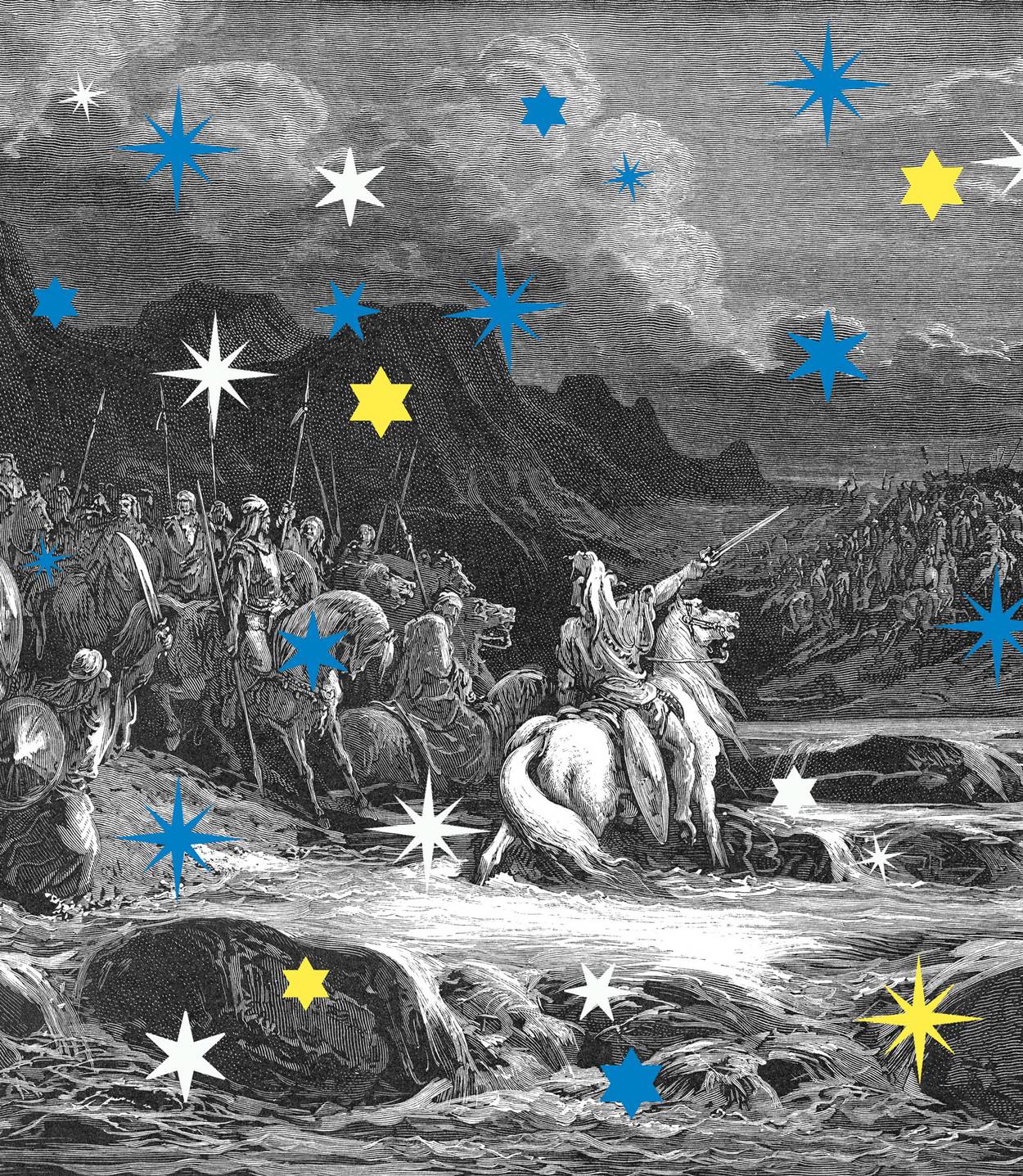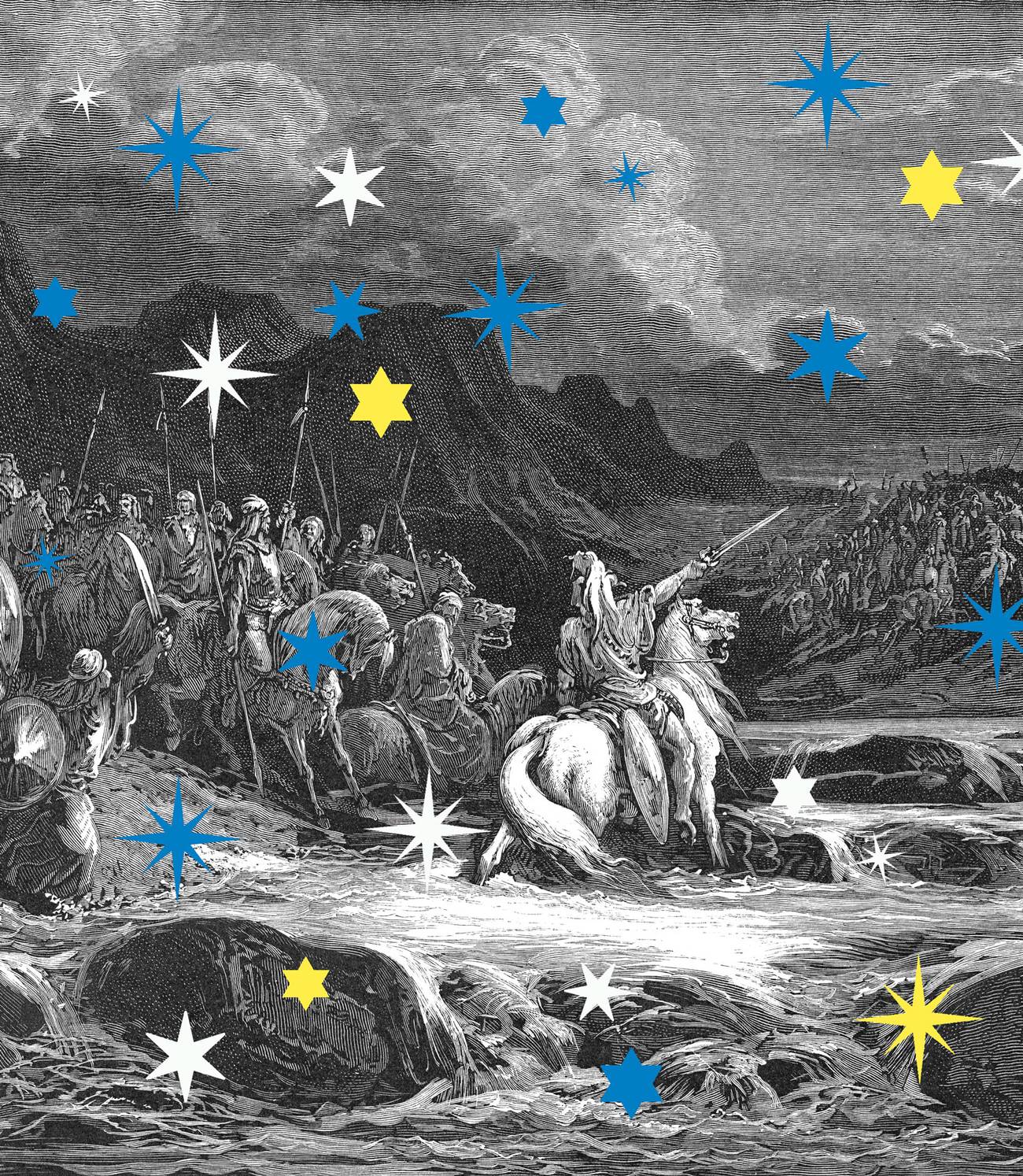The Battle Cry of Hanukkah
It’s time to bring back the spirit of Jewish defiance and anti-assimilation

Tablet Magazine

Tablet Magazine

Tablet Magazine

Tablet Magazine
I hate Hanukkah.
Wait, let me revise that. I hate what Hanukkah has become.
A minor holiday in Israel, Hanukkah is often the one holiday celebrated by secular Jews in the diaspora. This could be a great thing, except that this story of resilience and faith has been boiled down to a materialistic echo of Christmas. We’ve completely lost sight of its ikar, its essence, and instead been left with a reminder of the failures and assimilation of the American Jew.
The typical understanding that most people have of the holiday is that a group of Jews called the Maccabees were the underdogs in a fight against their Greek oppressors, they lit candles that burned for eight nights when there was only enough oil for one, and that’s why we now light the menorah.
Except Hanukkah is not just a cute story about an oil miracle or a time for presents. The plotline in the books of the Maccabees is as good as a high-budget HBO series, filled with gory scenes, bravery, chiseled naked men, and backstabbing.
Above all, the story of the Maccabees is one of defiance and anti-assimilation. It’s about hard-as-nails Jews who fight for survival. It’s time we bring that back.
There were two main battles during the Hanukkah story: One was against the Greek Seleucids, but the other, equally important fight was an internal one. In near-fatal fashion, it began with a loss of cultural clarity.
The high priesthood was a very wealthy, upper class group that the Greeks had started to buy off before the rise of the Hasmoneans, the kingdom that came to form under the Maccabees. Just before the Hasmonean battles, a new high priest named Joshua technically kept Jewish laws but welcomed Hellenization into everyday life, including opting for the Greek name of Jason and establishing a gymnasium. At one point, there weren’t even enough priests to serve sacrifices in the Temple because they were—wait for it—at a discus match.
As Jewish identity frayed on the edges, the ruling Seleucid King Antiochus IV Epiphanes brought a new set of pressures. Unlike the previous rulers who had largely left Jewish culture and institutions alone, Antiochus directly targeted them. In one of his campaigns of persecution, Antiochus forced devout Jews to eat pork publicly as a display of cultural acceptance and submission. Famous acts of Jewish martyrdom come from this period, including when Antiochus commanded Rabbi Eleazar to participate in this public rebuke of Jewish observance. Instead, in a final act of defiance, Rabbi Eleazar dramatically spit out the food as an example to the young Jews who were watching. He was dragged away, tortured, and killed. Mattityahu, the father of the most famous character, Judah Maccabee, also refused to bend. He rejected a command to make a sacrifice to the Greek gods, and then stabbed and killed the Hellenistic Jew who stepped forward instead.
Don’t ignore the lesson here. It’s an uncomfortable one for us today. It is much easier to apply laws and stories as convenient and ignore the ones that directly challenge our modern choices. The argument here is not that we should all be black hats; I myself am far from frum. But it is to contend that we like to convince ourselves it’s acceptable to give up on the very things that make us Jewish in order to survive. Our entire history as a people, and especially the story of Hanukkah, reminds us that freedom and survival only come when we fight for it.
The story of the Maccabees is one of defiance and anti-assimilation. It’s about hard-as-nails Jews who fight for survival. It’s time we bring that back.
Fighting for Jewish independence and resisting attempts to chip away at our peoplehood—now that is the meaning of Hanukkah.
After the successful rebellion, the Maccabees rededicated the Temple on the 25th of Kislev by lighting the menorah with a cruse of pure oil that was meant to last only one day and lasted longer. This wasn’t actually so surprising; a miracle of light accompanied every previous rededication of the Temple, from Moses in the Mishkan to Solomon in the First Temple. It’s not the “miracle” of light that is the miracle. It’s what the light itself means: The Jews fought, the Jews succeeded, the Jews were back in their Temple.
The sages agree. In the laws of Megillah v’Chanukah, Maimonides gives a balanced recognition of both the victory and the oil. Even the Hebrew name for this holiday, Hanukkah, means a dedication, like the rededication of the altar (Hanukkat hamizbeach, 1 Maccabees 4:59). The Roman Jewish historian Josephus, in his famous Antiquities of the Jews, actually seems completely unaware of the oil miracle. He never describes the lighting of any menorah. Yet the same man who makes no mention of the oil miracle gave us the term used throughout the English-speaking world for Hanukkah: the Festival of Lights. His explanation is not of the light of the oil, but of bringing the freedom to worship out of the darkness and into the light. To Josephus, the miracle was the freedom to be a Jew.
Yet we must remember with all these dreamy tales of Jewish miracles and victories that while the Maccabees won the battle, they lost the war. They earned a century of autonomy, but it collapsed along with Jewish identity only a few generations later.
In many ways, how the Hasmoneans came to be is also how they fell. Jews who either claimed to be Jewish but weren’t, or were at least willing to do the bidding of the Romans out of their own thirst for power and status, took over once again, and this brief era of Jewish freedom was over.
This isn’t too surprising; people love having short memories, doing what is convenient and easy, and convincing themselves that the slope isn’t that slippery. The war was, and is, about sustaining the strength of the Jewish soul.
The Maccabees were such religious zealots that it bothered the secular pioneers of early Israel. In a surprising and hilarious anecdote in Shai Agnon’s Tmol Shilshom, we learn about a party to celebrate Hanukkah that included a statue of Mattityahu holding a sword in his hand to kill the person going to sacrifice the pig on the altar. The group “spent all night in riot and gluttony,” which we can assume means a sex orgy. The morning after, Eliezer Ben-Yehuda (you’ll recognize his name since he was the man who revived the Hebrew language) wrote an affectionate article in his newspaper about this party, complaining about the statue—not because it was borderline idolatry, which didn’t seem to bother him. Ben-Yehuda hated that Mattityahu and his sons sat on their hands as the Greeks took over the land of Israel and only took up arms once they had encroached on religion.
Then, in great clarity, Ben-Yehuda reflected on the fact that Mattityahu would likely have taken his sword to stab each person that had been at that party. He’s probably right. This was a party celebrating Mattityahu while betraying exactly the worldview he had fought for.
The victory of Hanukkah was rooted in the understanding that it takes standing up for the small things in order to protect the big ones. You can’t win a war if you don’t know who you are or give away pieces of yourself. We frequently take for granted what holds us together. This is the lesson of Hanukkah—and to drain this holiday of its real meaning is a tragedy.
That said, the lighting of the menorah is profound and still something to be celebrated. It is a deep reflection of receiving Hashem in darkness. But without looking at the larger context of the story misses the point entirely. To turn the story of Hanukkah into only the story of the oil, and to be assimilated, is a betrayal of everything.
The fight today, like then, is only partly about religion. The war begins with the culture; when the Jewish people give in to that pressure in a false attempt at self-preservation, we become weaker, not stronger. This isn’t the time for pretending a paltry “antisemitism committee” on a hostile college campus is a victory. Nor should we cower to the opinions of useful idiots who think we are too weak to fight back. And dare we convince ourselves that lighting a menorah in the same home as a Christmas tree is not a risk to preserving Jewish identity.
Hanukkah is a time to reinforce our good instincts. The Maccabees took the eight days of light as a sign that God believed in them. The miracle was the fire, the light that burned from within. The Hasmoneans weren’t prophets. They didn’t get direct messages from God—they simply knew what was worth fighting for. We intuitively know this as Jews today, too. But sometimes we get confused and forget. Lighting the candles can be a reminder: We do have a fire inside us. That fire is worth fighting for.
כי טוב לנו למות במלחמה, מראות ברע אשר ימצא את עמנו ואת מקדשנו
For it is better for us to die in battle, than to behold the calamities of our people and our sanctuary. (The Book of Maccabees 1, 3:59)
If the American Jew can wake up and remember this, well, then maybe I’ll start to like Hanukkah.
Arynne Wexler studies with Rabbi Joshua Weisberg of Jerusalem. She is a community member of Yakar Tel Aviv, Altneu New York, and Chabad Miami.